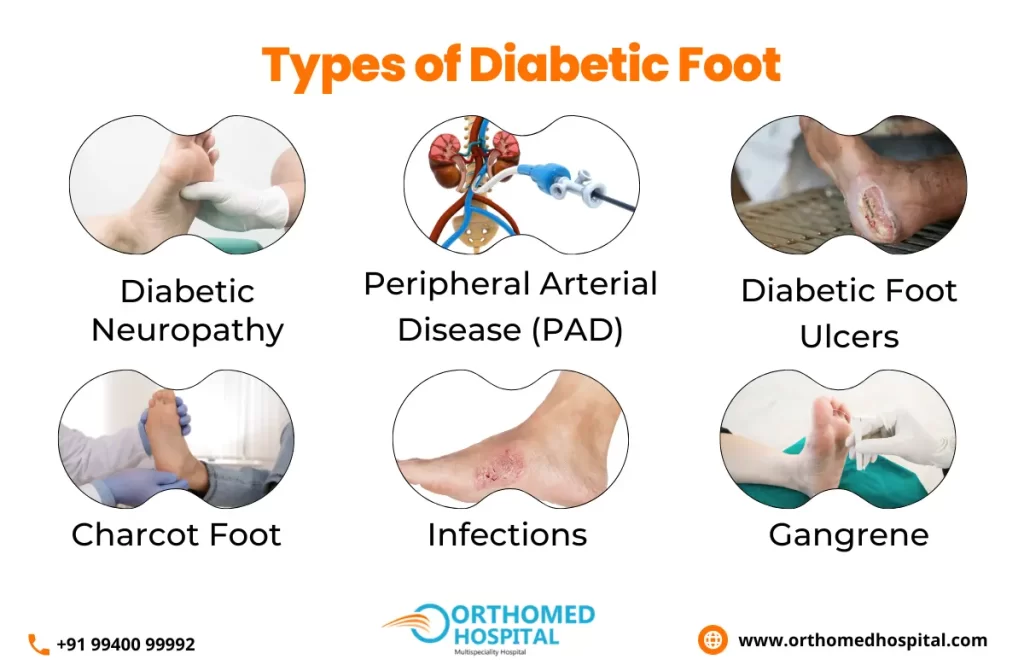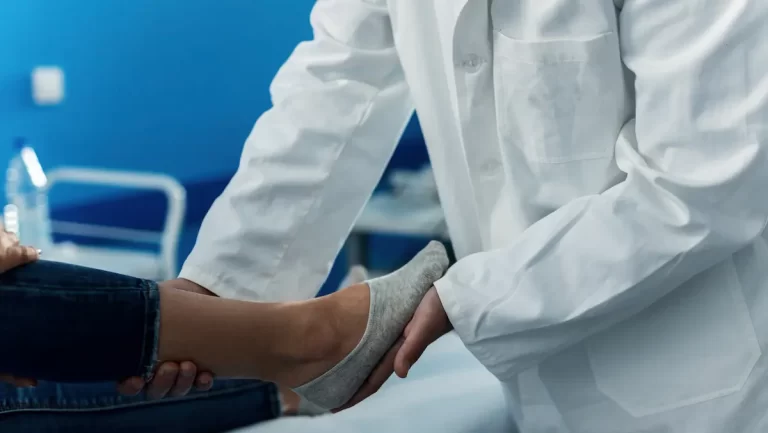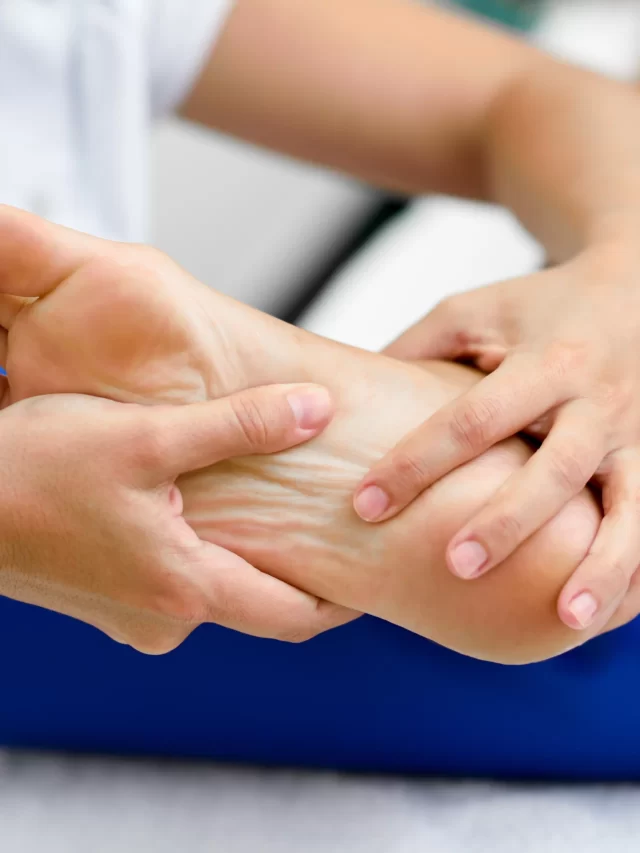What is Diabetic Foot?
Diabetic foot is a condition that affects people with diabetes, causing damage to the nerves and blood vessels in the feet. This can lead to a range of problems, including foot ulcers, infections, and in severe cases, amputation.
Diabetes is a persistent medical condition that impacts the body’s ability to regulate blood sugar, also known as glucose. Over time, high blood sugar levels can cause damage to the nerves and blood vessels in the feet, reducing blood flow and sensitivity to touch and temperature.
If left untreated at the diabetic foot clinic in Chennai, the diabetic foot can lead to a range of complications, including foot ulcers, infections, and gangrene. These complications can be serious and may require hospitalization or even amputation of the affected limb.
To prevent diabetic foot complications, it is important for people with diabetes to take good care of their feet. This includes daily foot inspections to check for cuts, blisters, or other signs of damage, as well as wearing comfortable shoes and socks and avoiding walking barefoot.

If a foot ulcer or infection does occur, prompt treatment is essential to prevent further complications. Treatment provided by the foot specialist in Chennai may include cleaning and dressing the wound, antibiotics to treat infection, and in some cases, surgery to remove damaged tissue.
What is a Diabetic Foot Clinic?
At a diabetic foot clinic in Chennai, patients can receive a thorough foot exam to check for signs of damage, as well as education on proper foot care and footwear. The clinic may also provide wound care services to treat foot ulcers, infections, and other foot injuries.
In addition to providing direct care to patients, diabetic foot clinics often work closely with other healthcare providers, such as endocrinologists, primary care physicians, and podiatrists, to coordinate care and ensure that patients receive the most comprehensive treatment possible.
Patients who visit a diabetic foot clinic may also be referred for additional testing or imaging, such as X-rays or nerve conduction studies, to evaluate nerve function and blood flow in the feet.
The goal of a diabetic foot clinic in Chennai is to help patients with diabetes maintain healthy feet and prevent foot complications that can lead to more serious health problems, such as infections or amputations. By providing specialized care and education on proper foot care, diabetic foot clinics can help patients better manage their diabetes and improve their overall quality of life.
How to care for your feet?
1. Inspect your feet daily: Check your feet for cuts, blisters, redness, swelling, or any other signs of damage.
2. Wash your feet daily: Use warm water and mild soap to wash your feet daily, and be sure to dry them thoroughly, especially between your toes.
3. Moisturize your feet: Apply a moisturizing cream or lotion as suggested by a diabetic doctor at the diabetic foot clinic in Chennai to help prevent dry skin and cracking.
4. Wear proper footwear: Choose shoes that fit well, provide good support, and have a wide toe box to prevent rubbing and blisters.
5. Cut toenails carefully: Cut your toenails straight across and avoid cutting them too short or rounding the corners.
6. Keep blood sugar levels under control: High blood sugar levels can cause nerve damage and poor circulation, increasing your risk of foot complications.
7. Quit smoking: Quitting smoking can help improve circulation and reduce your risk of foot complications.
When to see a specialist?
It is important to see a doctor for diabetes foot care at the diabetic foot clinic in Chennai if you notice any signs of damage, such as cuts, blisters, redness, swelling, or pain. Additionally, you should see a doctor for diabetes foot care if you experience any of the following:
1. Numbness or tingling sensation in your feet or toes.
2. Changes in skin color or texture on your feet.
3. Foot sores or ulcers that do not heal.
4. Foul odor or discharge from a foot wound.
5. Difficulty walking or standing cause foot pain.
People with diabetes should also schedule regular foot exams with the best podiatrist in Chennai, typically every 3-6 months, to check for signs of damage or complications. Your healthcare provider can provide education on proper foot care and refer you to a specialist if needed.
Our Services at the Diabetic Foot Clinic in Chennai
Foot Ulcer
A foot ulcer is a common complication of diabetes and is caused by damage to the skin and underlying tissues. People with diabetes are at a higher risk of developing foot ulcers due to nerve damage and poor circulation. Foot ulcers typically develop on the bottom of the foot or toes and can be painful and slow to heal.
Here are some signs and symptoms of a foot ulcer:
- Redness or swelling around the ulcer.
- Pain or tenderness in the affected area.
- Drainage or discharge from the ulcer.
- A foul odor from the affected area.
- Skin that is warm to the touch.
If left untreated at the diabetic foot clinic in Chennai, foot ulcers can lead to serious complications, such as infection, gangrene, or amputation. It is important to seek prompt medical attention if you notice any signs of a foot ulcer or have concerns about your foot health.
Treatment for foot ulcers by the foot specialist in Chennai typically involves cleaning and dressing the wound, as well as addressing any underlying factors that may be contributing to the ulcer, such as poor blood sugar control, nerve damage, or poor circulation. Antibiotics may be necessary if the ulcer is infected.
Preventing foot ulcers is also an important aspect of diabetes foot care. This can involve maintaining good blood sugar control, inspecting your feet daily for signs of damage, wearing proper footwear, and following a regular foot care routine. By taking proactive steps to prevent foot ulcers and seeking prompt medical attention for any concerns, people with diabetes can help reduce their risk of serious foot complications and improve their overall quality of life.
Foot ulcer surgery may be recommended by the podiatric surgeon in Chennai, especially for people with diabetes who have foot ulcers that do not heal with other treatments. Surgery may be necessary to remove damaged tissue, promote healing, or improve blood flow to the affected area.
Types of foot ulcer surgery
- Debridement: This procedure performed by the best podiatrist in Chennai involves removing dead or infected tissue from the ulcer to promote healing. Debridement may be done using a scalpel, a special tool that removes dead tissue, or a high-pressure stream of water.
- Skin grafting: If the ulcer is large or deep, a skin graft may be needed to cover the wound and promote healing. In this procedure, a small piece of healthy skin is taken from another part of the body and placed over the ulcer.
- Revascularization: If poor blood flow is contributing to the ulcer, surgery may be necessary to improve blood flow to the affected area. This may involve opening blocked arteries or bypassing blocked blood vessels.
- Amputation: In severe cases where the ulcer does not heal and poses a risk to the person’s overall health, amputation may be necessary to prevent the spread of infection.
Foot ulcer surgery provided by the podiatric surgeon in Chennai is typically done under local anesthesia and can be performed on an outpatient basis. Recovery time varies depending on the type of surgery and the individual’s overall health.
Gangrene Surgery
Gangrene is a serious medical condition that occurs when tissue in the body dies due to a lack of blood flow. It is a common complication of diabetes and can occur in the hands, feet, or other areas of the body.
Gangrene surgery is typically recommended for people with advanced or severe gangrene who have not responded to other treatments. The goal of surgery by their podiatrist doctor in Chennai is to remove the dead tissue and prevent the spread of infection.
Types of gangrene surgery
- Debridement: This procedure involves removing the dead tissue from the affected area. Debridement may be done using a scalpel, a special tool that removes dead tissue, or a high-pressure stream of water.
- Amputation: If the gangrene is severe or the infection has spread, amputation may be necessary to prevent further damage or the spread of the infection. The level of amputation will depend on the extent of the gangrene.
- Revascularization: If poor blood flow is contributing to the gangrene, surgery may be necessary to improve blood flow to the affected area. This may involve opening blocked arteries or bypassing blocked blood vessels.
Gangrene surgery is typically done under general anesthesia and may require a hospital stay. Recovery time varies depending on the surgery type and the individual’s overall health.
It is important to note that gangrene surgery is often only one part of a comprehensive treatment plan for gangrene. Proper foot care and good blood sugar control are also essential for preventing and treating gangrene in people with diabetes. By working closely with their healthcare provider at the diabetic foot clinic in Chennai and following a regular foot care routine, people with diabetes can help reduce their risk of serious foot complications and improve their overall quality of life.
Charcot Joint Surgery
Charcot Joint, also known as Charcot foot or Charcot neuroarthropathy, is a condition that affects people with diabetes and can cause severe damage to the bones and joints in the foot. It occurs due to nerve damage, which leads to loss of sensation and an inability to feel pain or discomfort in the affected area.
Charcot Joint surgery is a treatment option for people with advanced Charcot Joint who have not responded to other treatments. The goal of surgery by the foot doctor in Chennai is to stabilize the foot and prevent further damage.
Types of Charcot Joint Surgery
- Reconstruction: This surgery involves rebuilding the bones and joints in the affected foot using screws, plates, or other hardware to hold the bones in place.
- Fusion: This surgery involves fusing the bones in the affected joint together to provide stability and prevent further damage.
- Amputation: If the Charcot Joint is severe or has led to complications, amputation by the foot doctor in Chennai may be necessary to prevent further damage or the spread of infection.
Charcot Joint surgery is typically done under general anesthesia and may require a hospital stay. Recovery time after surgery varies depending on the surgery type and the individual’s overall health.
What are the 5 stages of diabetic foot?
The five stages of diabetic foot are:
Stage 0: No ulceration, but at-risk foot.
Stage 1: Superficial ulcer.
Stage 2: Deep ulcer.
Stage 3: Abscess or osteomyelitis.
Stage 4: Gangrene or cellulitis.
These stages indicate the severity of foot complications in individuals with diabetes and help guide appropriate medical interventions and care to prevent further complications and amputations.
Is diabetic foot treatable?
Diabetic foot complications are treatable, especially if detected early. Treatment often includes wound care, infection management, glycemic control, and, in some cases, surgical interventions. It’s essential for individuals with diabetes to maintain good foot hygiene, monitor for signs of ulcers, and work closely with healthcare professionals to prevent and manage diabetic foot complications effectively. Early intervention and proper care can improve outcomes and reduce the risk of amputation.
Conclusion
It is important to note that Charcot Joint surgery is often only one part of a comprehensive treatment plan for Charcot Joint. Proper foot care and good blood sugar control are also essential for preventing and treating Charcot Joint in people with diabetes. By working closely with their podiatrist doctor in Chennai and following a regular foot care routine, people with diabetes can help reduce their risk of serious foot complications and improve their overall quality of life.
Read also General surgery in Chennai.


